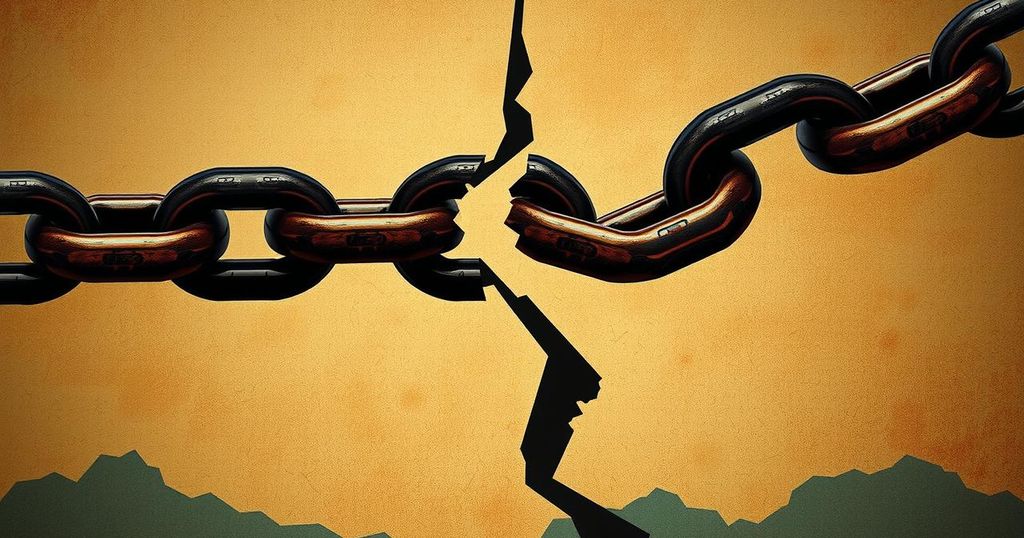The ongoing conflict in eastern DRC involves M23 rebels, allegedly backed by Rwanda, provoking protests in Kinshasa. UN experts assert Rwandan military control over M23 operations, amid accusations of advanced weaponry and training. Kagame justifies actions as defensive against threats from Hutu militias, while analysts emphasize political motives behind M23’s resurgence.
Protesters in Kinshasa, the capital of the Democratic Republic of Congo (DRC), have expressed their outrage against Rwandan President Paul Kagame, burning his portraits and destroying Rwandan flags amid the conflict that sees M23 rebels controlling Goma, a key city in eastern DRC. The United Nations has supported these accusations, stating that Rwandan military personnel effectively manage M23 operations, aiding in recruitment and providing advanced weaponry.
Goma, a critical humanitarian and trade center located on the border with Rwanda, faces renewed violence, disrupting communication and basic services as the M23 rebels continue to consolidate their power. The conflict has displaced many, with the city becoming a sanctuary for nearly two million fleeing the ongoing strife. UN peacekeeping chief Jean-Pierre Lacroix has confirmed the presence of Rwandan troops in the area supporting M23.
Despite Kagame’s denials of involvement, mounting evidence implicates Rwanda in the conflict. Richard Moncrief from the International Crisis Group notes a shift in Rwanda’s narrative, now framing their actions as defensive measures due to perceived threats from the fighting in Goma. Recently, Rwanda’s foreign ministry expressed concerns over security, attributing the conflict’s escalation to misinterpretations and failures by the Congolese government.
The historical context of the Rwandan genocide in 1994 complicates the current dynamics. Kagame has consistently identified the presence of Hutu militia in the DRC as a significant threat, leading to two previous military invasions. Kagame’s recent remarks criticize DRC President Félix Tshisekedi for inaction against militia groups, which Kagame believes aggravate tensions.
Analysts indicate that the M23’s activities, particularly its focus on Goma, may serve as a political statement rather than a strategic necessity, as they have already conquered more economically essential territories. Rwanda’s accusations against local authorities further signify the fragile relations in the region and Rwanda’s intolerance for perceived alliances with the FDLR.
The M23’s resurgence is also linked to long-standing grievances due to unmet peace agreements after their previous uprising. Recent reports indicate a resurgence of their military capabilities, attributed to high-level military training and advanced warfare techniques, including Rwandan officers’ involvement in training operations. Documents reveal that Rwandan forces are instrumental in the M23’s military maneuvers, employing superior weaponry not available to other local militia.
Both Rwanda and Uganda have been accused of facilitating M23’s operations, indicating a regional dimension to the conflict where multiple players are involved. Kagame has expressed frustration over a lack of cooperation from the Congolese side, resulting in a resurgence of M23 aggression that aligns with Rwanda’s strategic interests related to its national security.
Amidst these tensions, the East African Community aims to mediate, although Tshisekedi’s reluctance to cooperate raises questions about potential resolutions. Observers emphasize that Kagame is adamant that discussions must focus on the FDLR’s presence, a point he continually raises in forums discussing regional stability.
The ongoing conflict in the eastern Democratic Republic of Congo, particularly in Goma, is marked by the resurgence of the M23 rebel group, which has been allegedly supported by Rwanda. The accusations are rooted in a complex historical narrative, including the Rwandan genocide of 1994, which has left a legacy of violence and instability in the region. The geopolitical relationships among Rwanda, Uganda, and the DRC further complicate the security situation, with territorial and economic interests driving military engagements.
The situation in Goma and the surrounding areas reflects deep-seated historical tensions and regional complexities involving multiple actors, including Rwanda’s support for M23 rebels, which continues to challenge regional stability. As protests in Kinshasa illustrate the local sentiment against foreign involvement, the need for diplomatic mediation becomes increasingly critical to address both immediate conflicts and underlying grievances.
Original Source: www.bbc.com




